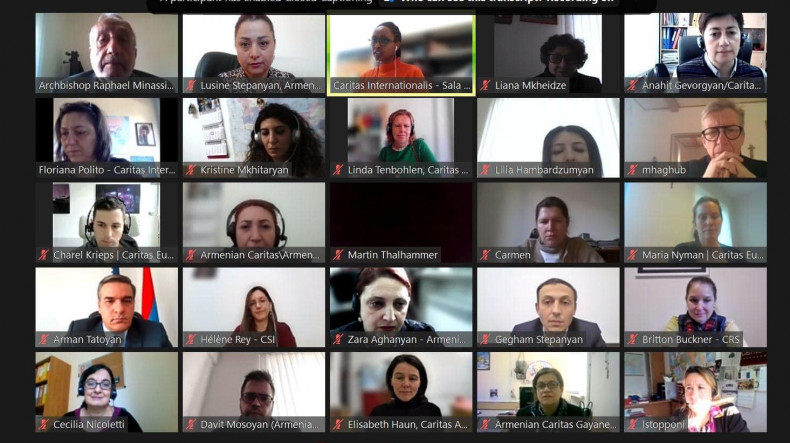
Caritas Confederation members alerted on Azerbaijan's Artsakh blockade
In January 2023, Armenian Caritas, supported by Caritas Internationalis and Caritas Europa in collaboration with the Center for Law and Justice Tatoyan Foundation, organized a teleconference alerting members on the blockade of the Lachin lifeline corridor for Artsakh (Nagorno-Karabakh) and the worsening human rights and humanitarian situation in the border communities of Armenia with Azerbaijan. The teleconference counted with participation of more than 45 representatives from Caritas Confederation member organizations from different countries, the Tatoyan Foundation reported on Monday.
The leader of Armenian Caritas, Catholicos Patriarch of Cilicia of Armenian Catholics His Beatitude Raphaël François Minassian welcomed the participants of the teleconference and emphasized the importance of any steps taken to prevent the humanitarian crisis and to protect fundamental human rights. Referring to the humanitarian crisis created in Nagorno-Karabakh due to the blockade of the Lachin Corridor, Minassian emphasized that Azerbaijan's actions are a gross violation of international humanitarian law.
Artsakh Ombudsman Gegham Stepanyan presented the results of fact-finding missions carried out from 12 December 2022 on a daily basis and the consequences resulting from the blockade by Azerbaijan of the only lifeline road connecting Artsakh to Armenia and the outside world since 12 December. Due to the blockade, fundamental human rights of 120.000 indigenous ethnic Armenians, including 30,000 children, 20,000 elderly and 9000 people with disabilities, have been violated. As a result, the population is facing a dire humanitarian crisis due to a lack of food, medicine and other essential goods and energy provision.
Moreover, the transfer of patients in critical condition for urgent treatment and hospitalization in the specialized medical centers of Armenia has become almost impossible. The right to education of the children in Nagorno-Karabakh has been disrupted. 41 kindergartens and 56 pre-schools have been completely or partially closed since January 9 due to the worsening food shortage under the blockade. As a result, 6,828 children are no longer able to attend kindergartens, preschools or day schools and are being deprived of the opportunity to receive proper care, nutrition, and education. Since January 18, all 118 schools in Artsakh have been closed due to heating and electricity supply problems, depriving almost 20,000 children of their right to education.
Also, as a result of the blockade, at least 1.100 people, among whom 270 children who had travelled to Armenia before 12 December to participate in cultural and sports events, were separated from their families and were unable to return back home for more than one month.
Director of the Tatoyan Foundation Arman Tatoyan presented the root causes, the results of the fact-finding missions and the current situation in the bordering communities of Armenia’s Syunik, Vayots dzor and Gegharkunik Provinces after the Azerbaijani aggression on 13-14 September 2022. Azerbaijani troops have occupied thousands of hectares of specially protected lands, agricultural, community lands, forests as well as water resources. Infrastructures including military roads are being built by the Azerbaijani armed forces in the occupied territories of the sovereign territories of the Republic of Armenia. Moreover, civilian communications and transport infrastructures, as well as educational institutions in several dozens of communities are directly targeted by the Azerbaijani military.
In some communities, the village schools are not functioning, civilians have suffered material losses (losses of animals due to theft, mine explosions); thus, they are unable to secure opportunities to maintain a viable family income. The fundamental rights of children and vulnerable people have been violated. The living conditions and security of the civilian population of bordering communities in Syunik, Vayots Dzor and Gegharkunik Provinces have drastically deteriorated.
The teleconference was aiming at bringing the attention of the Caritas Confederation on the current human rights and humanitarian situation of the civilian population in Artsakh and Armenia and the warning signs of ethnic cleansing of Armenians with a view to promoting solidarity and possible advocacy actions at global and national levels, notably in relation to guarantee unimpeded humanitarian access to urgently alleviate the suffering of the communities and promote full enjoyment of human rights.
Related news
- Azeri 'eco-activists' couldn't have reached Lachin corridor without authorities' permission – Tatoyan Foundation
- Tatoyan: Azeri 'eco-activist' agents intimidated 19 kids returning to Artsakh
Newsfeed
Videos






























